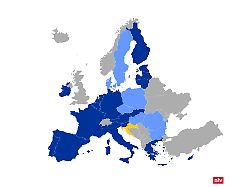New member in the Schengen area
Croatia adopts the euro
1/1/2023, 7:39 p.m
The European currency community is growing: the Adriatic state of Croatia will join the euro zone at the beginning of the new year. The old national currency, the Kuna, has been history since midnight. ECB boss Lagarde congratulates: “Croatia has worked hard.”
The European Central Bank (ECB) has welcomed Croatia as a new member of the euro area. “I welcome Croatia to the euro family and to the Governing Council table in Frankfurt,” said Central Bank President Christine Lagarde.
“Croatia worked hard to become the 20th member of the euro area and it was successful. I congratulate the Croatian people.” According to Lagarde, the euro is an attractive currency that brings stability to its members.
With Croatia’s entry into the euro area, the Croatian Central Bank – Hrvatska Narodna Banka (HNB) – officially a member of the Eurosystem, on an equal footing with the other national central banks such as the Deutsche Bundesbank, the Banque de France or the Banca d’Italia.
At the turn of the year, the EU country Croatia introduced the euro instead of the national currency kuna. At the same time, the country on the Adriatic joined the Schengen area. This means that the usual border controls are no longer applicable with immediate effect. For millions of holidaymakers from Germany, this means double relief: in future they will no longer have to exchange money for their stay in Croatia and will save themselves exchange rate losses.
Croatia joined the EU in 2013. In order to introduce the euro, the country had to meet a number of conditions. The exchange rate is fixed: one euro equals 7.5345 kuna. There is a transitional period until January 14, during which payments can still be made in both currencies.
“Time for New Beginnings”
Croatia is hoping for more stability from joining the euro in view of the strong inflation. In November, the rate of inflation in the country reached 13.5 percent – in the euro zone it was 10 percent. But the feelings of the population are mixed: Some fear that switching to the euro will increase the cost of living because many companies could round up their prices when converting. “It will be difficult,” said teacher Ivana Toncic from Zagreb. “Prices that are already high will get even higher.”
“It’s the time of new beginnings. And there is no place in Europe where this applies more than Croatia,” said EU Commission President Ursula von der Leyen at the start of her visit to Croatia. At a border crossing between Croatia and Slovenia, she met Croatian Prime Minister Andrej Plenkovic and Slovenian President Natasa Pirc Musar.
At a joint press conference, Plenkovic called his country’s entry into the Schengen area and the euro zone a “historic moment”. Von der Leyen made a similar statement, speaking of a “day for the history books”.
The EU Commission President and the Croatian head of government then traveled on to Zagreb. On the central square of the Croatian capital, Plenkovic invited von der Leyen to have a coffee – and paid the bill in euros.
